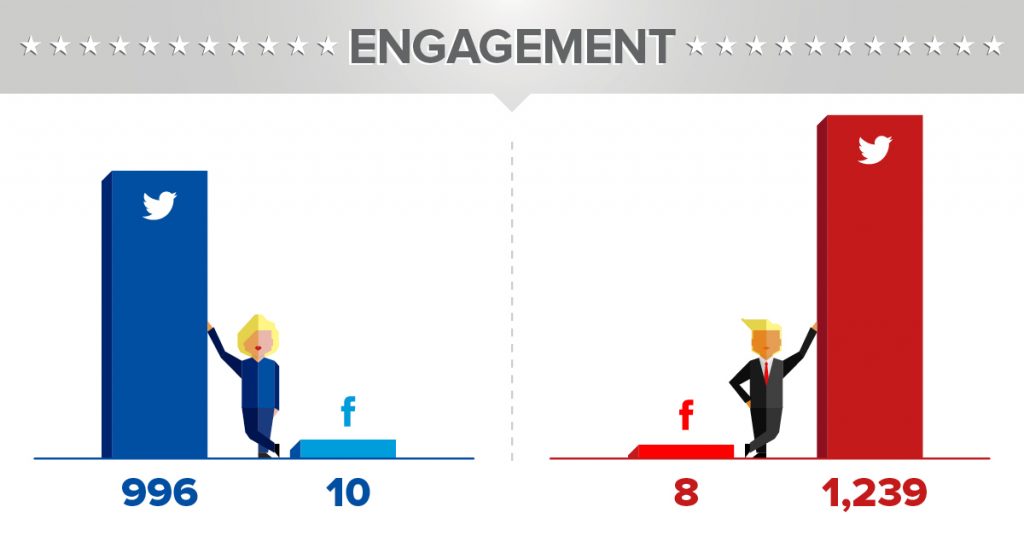This election will go down in history where unconventional campaign tactics and early voting made a significant difference. With as much as five percent of the voters still undecided, both candidates still have an opportunity to elevate their advocacy strategy and rally together their supporters for Election Day and the future.
With the less than two weeks left till the Presidential election, each candidate is campaigning hard and vying for the votes of the undecided. This is no small task. In order to win, each nominee will have to mobilize a diverse base of energetic champions.
Advocacy is a relationship-based approach that enlists the power of champions whose unified voice adds credibility to your campaign. These champions build a kind of influence that’s intangible, and they’re more important than ever.
Although the campaigns of the two candidates couldn’t be more different, both Trump and Clinton could benefit from an advocacy approach. Here’s what each should be doing in these final days:
Clinton: Get advocates talking about you.
The popularity of social media platforms has created a quicker dissemination of information which has caused audiences to understand and make decisions faster. Research has found that many voters say they have learned about the presidential election and the candidates though social media.
On social media, Trump engages with ordinary people through sharing their posts and retweeting. By directly interacting with his followers, Trump is actively creating a conversation that involves his champions and ultimately gives him an advantage.
Meanwhile, Clinton shares carefully crafted messages but lacks a direct interaction with her audience. By engaging with individuals and building relationships with followers, she will be able to expand her message to a larger audience.

Clinton: Make people feel good about supporting you.
Advocacy is about rallying champions around a cause for which they’re willing to align themselves with and speak out about. More than ever, the sentiment of many voters is a dislike for either candidate yet the passion of Trump’s supporters is palpable.
In terms of Clinton’s supporters, they are unanimously dedicated but lack the intensity that many of Trump’s supporters yield. Trump dominates media to the point that even messages about Clinton are about him while the conversation around Clinton supporters are often a reaction to Trump.
Clinton needs to distance herself from a conversation focused around Trump to a message that elevates her policies. By enlisting her supporters to reroute the conversation and speak to the heart of who she is, she can rally voters who feel good about supporting her.
Clinton: Continue to focus on the ground game.
Although social media is a crucial element of a campaign, winning the presidency requires building a higher level of advocacy engagement. Each candidate needs supporters who will help with their ground game efforts and actively engage voters in the field. This is the one area where Clinton has an advantage.
As unconventional as Trump may be, he simply relies on passion to persuade voter turnout whereas Clinton has taken a more conventional approach by using a tangible effort to increase voter turnout. By hosting fundraisers, helping register voters and reminding supporters of voting deadlines, Clinton is able to leave a lasting impression on individuals in an effort to gain support.
Throughout Trump’s candidacy he has encountered various staffing problems, as well as turmoil within the Republican Party due to his candidacy which has hindered ground game efforts.
Clinton and the Democrats have the ability to put more feet on the ground. By focusing on this effort she is able to gain traction in areas where Trump is not as strong.
Trump: Rally your supporters to action.
Throughout Trump’s candidacy he has been highly emotional yet lacks a clear strategy behind many of his proposed policies. In order to win, he should leverage his strong social following and elevate the conversation around his plan in order to get his message out.
Effective advocacy is equipping your champions with the right tools and information so they are willing to take action on your behalf. By creating champions, Trump can influence his social following into ground game efforts.
Trump: Be specific about your plan.
For those still deciding on which candidate should earn their vote, the decisions about the specifics of each candidate’s plan is crucial. Although both candidates could provide more insight to each of their proposed policies, Trump lacks details to his innovative ideas.
He has had great success at keeping his loyal followers engaged, but rhetoric doesn’t reach undecided voters or those in the middle of the political spectrum.
Trump: Get back to the original message
Trump’s appeal to voters is his expertise in the business realm, which is a quality advocates can get behind. With so many outliers in his campaign, much of his original message has been lost.
Trump has an opportunity to get his message back on track and continue to elevate the conversation by highlighting his business experience and background as reputable experience needed to run the country.
As one of the most historic elections comes down to its final days, every campaign measure is important. In order to win, each candidate should actively engage with these undecided voters by disseminating their clear and concise message in a meaningful way that mobilizes individuals for their vote.
2016_final_how_unelectables_win_undecideds